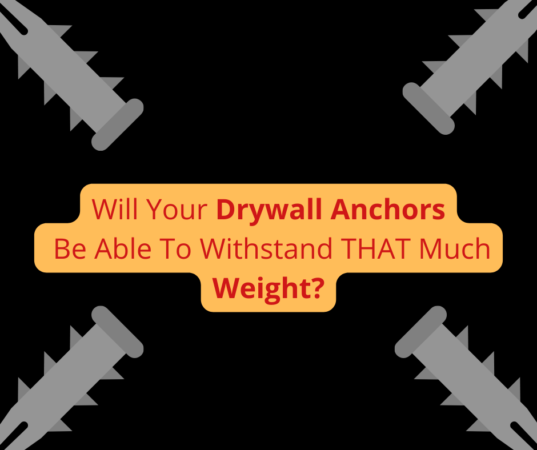Will Your Drywall Anchors Be Able To Withstand That Much Weight? – 6 Things To Look Out For
Drywall anchors are a useful tool for hanging items on walls, but with so many options available, it can be overwhelming to know which one to choose. In this article, we’ll go over the different types of drywall anchors, their purposes, and what to consider when making your buying decision.

Types of Drywall Anchors
There are several types of drywall anchors to choose from, each with its own unique features and benefits. Here are some of the most common types:
Plastic anchors
Plastic anchors are the most basic and economical option. They are made from a soft, pliable material that is easy to install by simply pressing them into the drywall with a screwdriver. Plastic anchors are suitable for light to medium loads and can support up to 20 pounds. However, they are not as durable as other options and are not suitable for heavy loads.
Toggle bolts
Toggle bolts are a step up in strength and durability from plastic anchors. They consist of a bolt and a spring-loaded toggle that expands to hold the anchor in place once it is inserted into the drywall. Toggle bolts are good for heavy loads and can support up to 50 pounds, but they can be difficult to install and may require a larger hole in the drywall.
Hollow-wall anchors
Hollow-wall anchors are designed for use in hollow walls, such as those made of drywall or plaster. They consist of a screw and a sleeve that expands as the screw is tightened, creating a secure hold. Hollow-wall anchors are good for medium to heavy loads and can support up to 50 pounds. They are relatively easy to install and do not require a large hole in the drywall.
Screw-in anchors
Screw-in anchors, also known as molly bolts, are another option for hanging heavy items on drywall. They consist of a metal sleeve that is inserted into the drywall and a screw that is tightened to expand the sleeve and create a secure hold. Screw-in anchors are strong and can support up to 50 pounds, but they require a larger hole in the drywall and can be more difficult to install than other options.
Self-drilling anchors
Self-drilling anchors are a convenient option for hanging items on drywall or other surfaces without the need for a separate drill. They have a sharp tip that allows them to be easily inserted into the drywall and a screw that is tightened to expand the anchor and create a secure hold. Self-drilling anchors are suitable for medium to heavy loads and can support up to 50 pounds. They are easy to install and do not require a large hole in the drywall.
Wall toggle anchors
Wall toggle anchors, also known as butterfly anchors, are a type of toggle bolt that is designed for use in hollow walls. They consist of a bolt, a plastic anchor, and a spring-loaded toggle that expands to hold the anchor in place once it is inserted into the drywall. Wall toggle anchors are good for heavy loads and can support up to 50 pounds, but they can be difficult to install and may require a larger hole in the drywall.
Conical anchors
Conical anchors, also known as expansion anchors, are a type of drywall anchor that expands as the screw is tightened to create a secure hold. They are made from a hard, durable material and are suitable for heavy loads. Conical anchors are easy to install and do not require a large hole in the drywall, but they may not be as strong as toggle bolts or screw-in anchors.
Magnetic anchors
Magnetic anchors are a unique option for hanging items on drywall or other ferromagnetic surfaces. They consist of a magnetic base and a screw that is tightened to hold the anchor in place. Magnetic anchors are suitable for light to medium loads and can support up to 10 pounds. They are easy to install and do not require any holes in the wall, but they may not be suitable for heavy items or non-ferromagnetic surfaces.
Choosing the Right Drywall Anchors
When choosing a drywall anchor, there are a few things to consider. First, consider the weight of the object you will be hanging. If the object is very heavy, you’ll need a stronger anchor such as a toggle bolt, screw-in anchor, or conical anchor. If the object is lighter, a plastic anchor, hollow-wall anchor, or self-drilling anchor may be sufficient.
Next, consider the type of drywall you have. If you have thin or fragile drywall, you’ll want to choose an anchor that requires a smaller hole, such as a plastic anchor, self-drilling anchor, or conical anchor. If you have thicker or more durable drywall, you can use a toggle bolt, screw-in anchor, or wall toggle anchor.
It’s also important to consider the type of fastening device you will be using. Some anchors are designed to be used with specific types of screws or nails, so make sure to choose an anchor that is compatible with your fastening device. For example, toggle bolts and wall toggle anchors are typically used with bolts, while plastic anchors, hollow-wall anchors, and self-drilling anchors are usually used with screws.
More About Drywall Anchors
In addition to these factors, there are a few other things to look out for when buying drywall anchors. Make sure to choose an anchor that is appropriate for the type of wall you have, as some anchors may not work on certain surfaces such as brick or concrete. Also, pay attention to the size and length of the anchor, as it needs to be long enough to provide a secure hold but not so long that it goes through the other side of the wall.
Another important consideration is the overall quality of the anchor. Look for anchors that are made from durable materials and have good reviews from other customers. Avoid cheap, low-quality anchors as they are more likely to break or fail.
Conclusion
In conclusion, there are many options available when it comes to choosing a drywall anchor. Each type has its own unique features and benefits, and the right one for you will depend on the weight of the object you are hanging, the type of drywall you have, and the type of fastening device you will be using. By considering these factors and looking out for the quality of the anchor, you can choose the best drywall anchor for your needs and ensure that your items are securely and safely hung on your walls.


